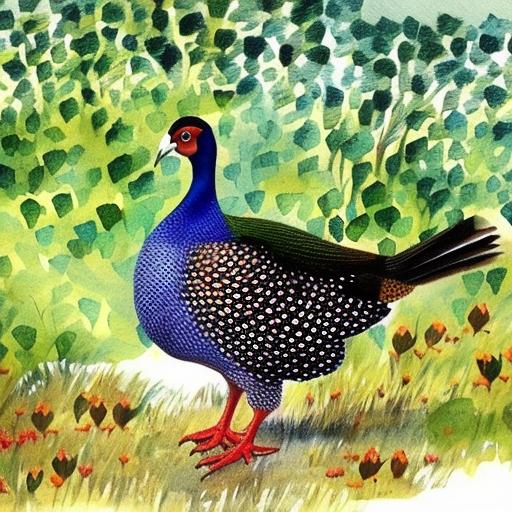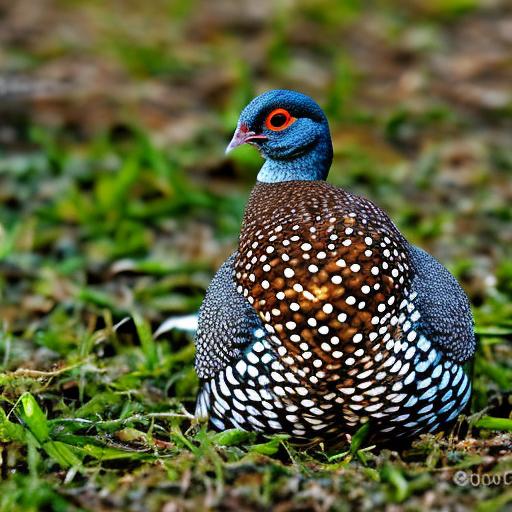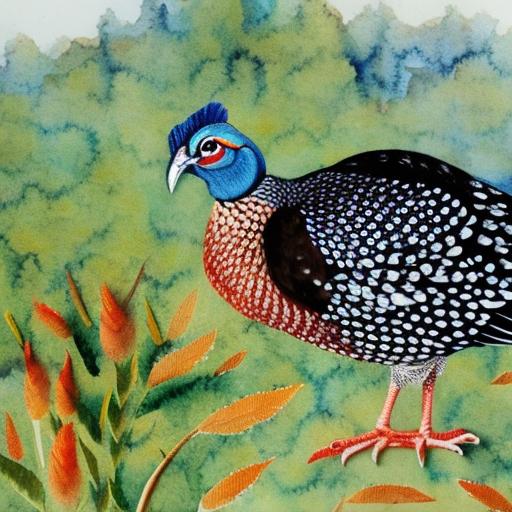Guinea fowl breeding in India has gained popularity in recent years due to the increasing demand for their meat and eggs. Guinea fowl are known for their unique flavor and lean meat, making them a popular choice for consumers looking for a healthy and sustainable protein source. In addition to their meat, guinea fowl eggs are also in high demand for their rich flavor and nutritional value. As a result, many farmers and entrepreneurs are turning to guinea fowl breeding as a profitable venture in the poultry industry.
Guinea fowl are hardy birds that are well-suited to the Indian climate, making them relatively easy to raise compared to other poultry species. They are also known for their ability to forage for insects and pests, making them an ideal choice for organic and free-range farming systems. With the right knowledge and resources, guinea fowl breeding can be a rewarding and profitable business opportunity for farmers and entrepreneurs in India.
Key Takeaways
- Guinea fowl breeding is gaining popularity in India due to the high demand for their meat and eggs.
- Select breeding stock with good health, strong genetics, and high fertility to ensure successful breeding.
- Provide spacious and well-ventilated housing with access to outdoor areas for guinea fowl to thrive.
- A balanced diet with adequate protein and essential nutrients is crucial for the health and productivity of guinea fowl.
- Proper incubation techniques and regular health checks are essential for successful hatching and disease prevention in guinea fowl breeding.
Selecting the Right Breeding Stock
Selecting the right breeding stock is crucial for successful guinea fowl breeding. When choosing breeding stock, it is important to select birds that are healthy, vigorous, and free from any genetic defects or deformities. Look for birds that are active, alert, and have good body conformation. It is also important to select birds that come from reputable breeders or suppliers to ensure the quality and genetic diversity of the breeding stock.
When selecting breeding stock, consider the specific traits and characteristics you want to improve in your flock, such as meat production, egg production, or coloration. It is also important to maintain a balanced ratio of males to females in your breeding flock to ensure successful mating and fertility. Additionally, consider the age of the breeding stock, as younger birds are generally more fertile and productive than older birds. By carefully selecting the right breeding stock, you can improve the overall quality and productivity of your guinea fowl flock.
Housing and Environment for Guinea Fowl Breeding
Creating the right housing and environment for guinea fowl breeding is essential for the health and productivity of the birds. Guinea fowl require a secure and predator-proof housing structure that provides protection from the elements and ample space for roosting and nesting. The housing should also have good ventilation to prevent respiratory issues and adequate lighting to stimulate egg production.
When designing the housing for guinea fowl, consider the natural behaviors of the birds, such as their preference for perching and roosting at night. Provide roosting bars or platforms for the birds to perch on, as well as nesting boxes or areas for egg-laying. It is also important to provide access to outdoor areas for foraging and exercise, as guinea fowl are active birds that thrive in free-range environments.
In addition to housing, it is important to create a suitable environment for guinea fowl breeding. This includes providing access to clean water, nutritious feed, and natural foraging areas. Consider planting shrubs or providing natural cover to create a stimulating environment for the birds. By creating a suitable housing and environment for guinea fowl breeding, you can ensure the health and well-being of your flock.
Feeding and Nutrition for Guinea Fowl
Feeding and nutrition play a crucial role in the health and productivity of guinea fowl. A well-balanced diet is essential for supporting growth, egg production, and overall health in guinea fowl. Guinea fowl are omnivorous birds that require a diet rich in protein, vitamins, and minerals. In addition to commercial poultry feed, guinea fowl also benefit from access to natural foraging areas where they can find insects, seeds, and vegetation.
When formulating a diet for guinea fowl, it is important to provide a high-quality poultry feed that is specifically formulated for guinea fowl. Look for feeds that contain a balanced ratio of protein, carbohydrates, fats, vitamins, and minerals to support the nutritional needs of the birds. Additionally, consider supplementing the diet with fresh fruits and vegetables, as well as grit or oyster shell for calcium supplementation.
It is also important to provide access to clean and fresh water at all times, as guinea fowl require ample hydration for optimal health and productivity. Monitor the feeding behavior and body condition of the birds to ensure they are receiving adequate nutrition. By providing a well-balanced diet and proper nutrition, you can support the growth, egg production, and overall health of your guinea fowl flock.
Breeding and Incubation of Guinea Fowl Eggs
Breeding and incubating guinea fowl eggs is an important aspect of guinea fowl breeding. Guinea fowl are seasonal layers, with peak egg production occurring during the spring and summer months. To encourage successful breeding and egg production, it is important to maintain a balanced ratio of males to females in the breeding flock. Provide nesting boxes or areas where the hens can lay their eggs in a quiet and secluded environment.
Once the eggs are laid, they can be collected daily and stored in a cool and humid environment until they are ready for incubation. Guinea fowl eggs have a longer incubation period compared to chicken eggs, typically taking 26-28 days to hatch. When incubating guinea fowl eggs, it is important to maintain consistent temperature and humidity levels throughout the incubation period.
Guinea fowl eggs can be incubated using a commercial egg incubator or by using a broody hen. Monitor the development of the embryos closely during incubation to ensure they are developing properly. Once the eggs hatch, provide a warm and secure brooding area for the keets (baby guinea fowl) to ensure their survival and well-being. By understanding the breeding and incubation process of guinea fowl eggs, you can successfully raise healthy and productive flocks.
Health and Disease Management in Guinea Fowl Breeding

Maintaining the health of your guinea fowl flock is essential for successful breeding and productivity. Guinea fowl are generally hardy birds but are susceptible to certain diseases and health issues. To prevent disease outbreaks, it is important to practice good biosecurity measures, such as quarantining new birds before introducing them to the flock and maintaining a clean and sanitary environment.
Regular health checks should be conducted to monitor the overall condition of the birds and identify any signs of illness or disease. Common health issues in guinea fowl include respiratory infections, parasites, and nutritional deficiencies. Provide access to clean water, nutritious feed, and natural foraging areas to support the overall health of the birds.
In addition to preventative measures, it is important to have a working relationship with a veterinarian who specializes in poultry health. This will ensure that you have access to professional advice and treatment options in case of any health issues or emergencies. By implementing good health management practices, you can minimize the risk of disease outbreaks and maintain a healthy and productive guinea fowl flock.
Marketing and Selling Guinea Fowl Products in India
Marketing and selling guinea fowl products in India can be a lucrative venture for farmers and entrepreneurs. Guinea fowl meat is known for its unique flavor and lean texture, making it a popular choice for consumers looking for high-quality protein sources. In addition to meat, guinea fowl eggs are also in high demand for their rich flavor and nutritional value.
To market guinea fowl products effectively, it is important to highlight their unique qualities and benefits compared to other poultry products. Consider promoting the lean and flavorful nature of guinea fowl meat, as well as the rich flavor and nutritional value of their eggs. Utilize various marketing channels such as social media, farmer’s markets, specialty grocery stores, and restaurants to reach potential customers.
In addition to marketing, it is important to establish reliable distribution channels to ensure that your guinea fowl products reach consumers in a timely manner. Consider partnering with local retailers or restaurants that specialize in organic or specialty meats to showcase your products. By effectively marketing and selling guinea fowl products in India, you can capitalize on the growing demand for high-quality poultry products in the market.
In conclusion, guinea fowl breeding in India offers a promising opportunity for farmers and entrepreneurs looking to enter the poultry industry. By selecting the right breeding stock, providing suitable housing and environment, ensuring proper feeding and nutrition, understanding breeding and incubation processes, implementing good health management practices, and effectively marketing and selling guinea fowl products, you can establish a successful guinea fowl breeding business in India. With the increasing demand for high-quality poultry products in the market, guinea fowl breeding has the potential to be a profitable venture for those willing to invest time and resources into this unique poultry species.
If you’re interested in learning more about guinea fowl breeding in India, you might also want to check out an insightful article on when guinea fowl lay eggs on PoultryWizard’s website. This article provides valuable information on the egg-laying habits of guinea fowl, which can be crucial for successful breeding and raising of these unique birds. You can find the article here.
FAQs
What is guinea fowl breeding?
Guinea fowl breeding refers to the process of raising and breeding guinea fowl for their meat, eggs, and pest control abilities. It involves providing proper care, housing, and nutrition to the birds to ensure their health and productivity.
Why breed guinea fowl in India?
Guinea fowl are known for their ability to control pests such as ticks, flies, and other insects, making them valuable for pest control in agricultural settings. Additionally, they are also raised for their meat, which is considered a delicacy in many parts of India.
What are the key considerations for guinea fowl breeding in India?
Key considerations for guinea fowl breeding in India include providing suitable housing, ensuring access to proper nutrition, managing disease and parasite control, and understanding the breeding and hatching process.
What are the common breeds of guinea fowl in India?
The most common breeds of guinea fowl in India include the Helmeted Guinea Fowl and the Vulturine Guinea Fowl. These breeds are known for their adaptability to different climates and their ability to thrive in Indian conditions.
What are the challenges of guinea fowl breeding in India?
Challenges of guinea fowl breeding in India may include managing predators, providing suitable housing and protection from extreme weather conditions, and ensuring proper nutrition and disease management.
What are the potential benefits of guinea fowl breeding in India?
The potential benefits of guinea fowl breeding in India include pest control in agricultural settings, production of meat and eggs for consumption, and potential income generation for farmers and breeders.
Meet Walter, the feathered-friend fanatic of Florida! Nestled in the sunshine state, Walter struts through life with his feathered companions, clucking his way to happiness. With a coop that’s fancier than a five-star hotel, he’s the Don Juan of the chicken world. When he’s not teaching his hens to do the cha-cha, you’ll find him in a heated debate with his prized rooster, Sir Clucks-a-Lot. Walter’s poultry passion is no yolk; he’s the sunny-side-up guy you never knew you needed in your flock of friends!







